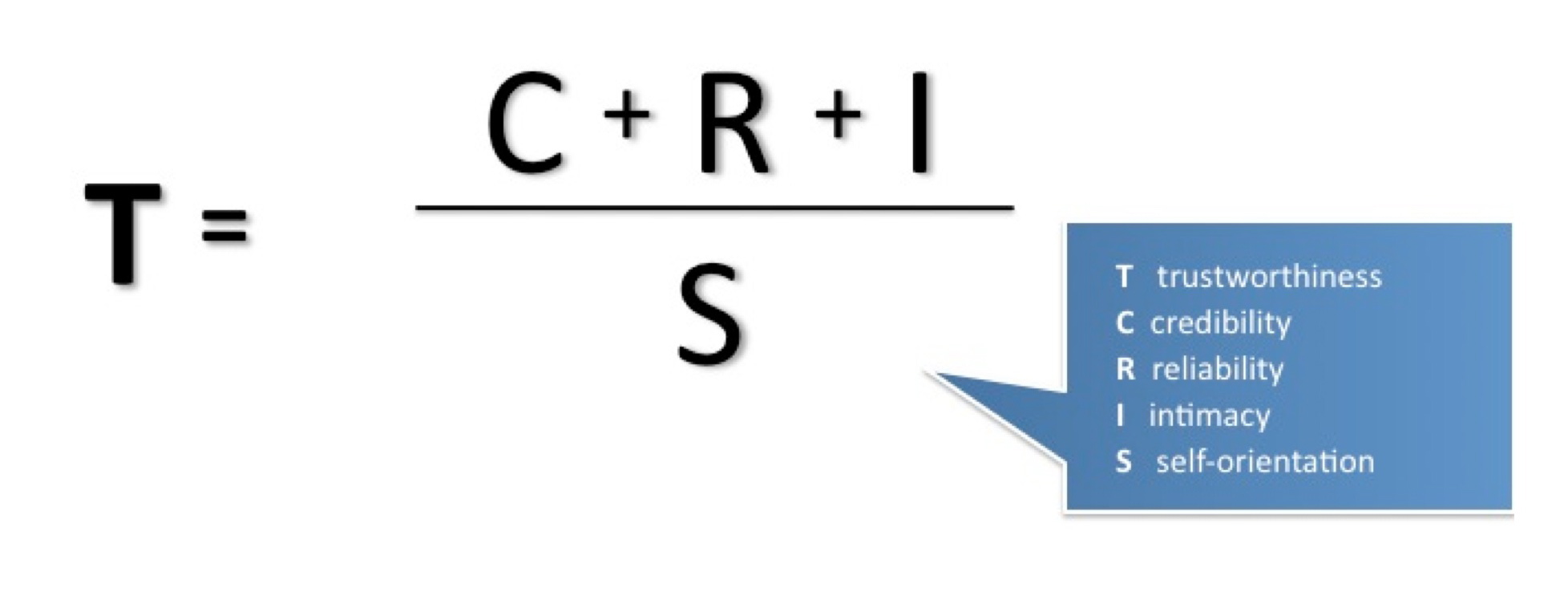 It’s one of the hardest parts of selling—that knife edge space where company revenue stream meets interior personal psychology. It is business, and it is personal.
It’s one of the hardest parts of selling—that knife edge space where company revenue stream meets interior personal psychology. It is business, and it is personal.
Most solutions share one problem; they are narcissistic, leading the salesperson to believe it’s all about them.
But it’s not all about you. And the sooner you build that insight into your selling, the better.
This is a topic I wish I had written more about in Trust-based Selling, so I’m glad to amplify it here.
Why Dealing with Rejection Messes You Up
Let’s start with the obvious. If you’re not getting some rejections, you’re probably not taking enough risks. So if you avoid rejection, you’re avoiding risk; which means you’re losing sales.
But that’s not all. If you’re avoiding rejection, on some level you know it. If you know you’re avoiding something, you know you’re not doing what you know you could do; you’re not living up to your own self-image. That soaks up a whole lot of energy; it makes you inward focused and unhappy. None of which helps you as a salesperson.
So avoiding rejection hurts your business, and it makes you feel unhappy. Inability to handle rejection hurts you everywhere it counts.
The Three Usual Solutions to Rejection—and Their Weaknesses
There are three common approaches to dealing with rejection. I’ve given them each distinctive names. They are:
1. Endure it. This approach suggests there is some natural relationship between the numbers of rejections you have to endure to get to the good stuff. If you spin the wheel long enough, your number will come up. Get out there and dial for dollars.
The problem: it’s hard to treat prospects as people if you’re just counting their no’s.
2. Shrink it. This approach says. “It’s not about you, it’s not personal, you shouldn’t feel hurt.” Bring in the shrinks; think your way into not feeling.
The problem: it really is personal, it’s about as personal as it gets–and you know it.
3. Motivate through it. This approach relies on getting you ‘motivated,’ which usually means pumped up, psyched, and able to just play through the pain.
The problem: prospects don’t appreciate being bulldozed.
Why “Handling Rejection” is Narcissistic
All those solutions have one defect: they’re all about managing your psychological response to an issue called “rejection.” But rejection is an imaginary concept—a fiction, a figment of your imagination.
“Rejection” is a belief that if something happened that affected you, then it must have happened to you—that it was about you, concerning you, because of you, etc. And that’s what I’ll refer to as narcissism—a tendency to view everything as being about you.
(Not-so-ancient societies used to believe that the sun and the planets revolved around the earth. There’s a very natural human tendency to believe that we are at the center of our own anthropomorphic universe, our own private Idaho. Much of growing up is getting over this idea, and most of us are only partially successful at it).
Instead of “dealing with rejection” let’s focus on what’s really going on in the real world—the world outside your head.
Curiosity is the Real Antidote to Rejection
Think of selling as a scavenger hunt. On a scavenger hunt, you go off into a relatively unstructured environment, looking for pre-defined items to collect. Of course, you’re interested in winning; but the game itself is fun as well.
In the game, you decide how and where to spend your time. You set priorities, and notice how and what your competitors are doing. There is skill involved in collecting the items. And you often end up in blind alleys when a particular path didn’t pan out for you.
What you don’t feel on a scavenger hunt is rejection. There simply is no such thing. It is not about you; it is just a process involving many people, of whom you are one.
All you need on a scavenger hunt is curiosity. And curiosity is a perfect emotion to bring to sales. Curiosity means you don’t have to ignore your emotions, or play through them, or convince yourself you’re immune to them. Instead, you’re just paying attention to a different set of issues. Let’s call those issues ‘reality.’
In the real world, nothing is being rejected; there are simply solutions and fits, or no-solutions and no-fits. It’s not a struggle–it’s a puzzle. If you’re a good solution to that puzzle and are curious enough, you might solve it. If you’re not a good solution for it, and/or aren’t curious, then you probably won’t.
So where’s ‘rejection’ in all this? In your head. So just stop it.
Three Steps You Can Take to Reject Rejection
1. Make a list of questions you’d like to know about each of your key prospects. Real questions, things you’d really like to learn.
2. Just as you would in a scavenger hunt, keep track of what you’ve learned at each blind alley. You don’t win scavenger hunts sitting back at the office; you learn it going out and finding blind ends.
3. Be alive. Have fun. Keep your ears open. There’s no point in blinding your senses in a scavenger hunt; why blind your emotions in the sales hunt? Just use them to figure out the puzzle.
Did the post-Copernican western world feel “rejected” by the sun when they found out it didn’t revolve around the earth? Of course not–though they probably did feel deflated. But that was just because they were cosmologically narcissistic. You don’t have to be that dumb or that narcissistic.
Nobody can reject you without your complicity in defining ‘rejection.’ Any time you hear ‘handling rejection,’ learn to laugh at yourself for thinking it’s about you–and go back to being curious.
![]() Tues. Mar. 15th New York, NY Charles H. Green
Tues. Mar. 15th New York, NY Charles H. Green Wed. Mar. 16th Global Charles H. Green
Wed. Mar. 16th Global Charles H. Green![]() Mon. Mar. 28th New York, NY Sandra Styer
Mon. Mar. 28th New York, NY Sandra Styer![]() Wed. Apr. 27th Fargo, ND Sandra Styer
Wed. Apr. 27th Fargo, ND Sandra Styer The first tranche of the Trusted Advisor Mastery Program is completing its final month. Members are taking stock. Here’s what one participant has to say:
The first tranche of the Trusted Advisor Mastery Program is completing its final month. Members are taking stock. Here’s what one participant has to say:
 Readers of this blog know that we often write about
Readers of this blog know that we often write about  It’s one of the hardest parts of selling—that knife edge space where company revenue stream meets interior personal psychology. It is business, and it is personal.
It’s one of the hardest parts of selling—that knife edge space where company revenue stream meets interior personal psychology. It is business, and it is personal. What profession do you think has the most ultimate trusted advisors per capita? Consultants? Doctors? Financial planners? I now know where my vote goes. PICU nurses.
What profession do you think has the most ultimate trusted advisors per capita? Consultants? Doctors? Financial planners? I now know where my vote goes. PICU nurses. Get the TrustReader volume 8 here
Get the TrustReader volume 8 here The first tranche of the
The first tranche of the  We’ve all had those moments when we realized we knew something that someone else didn’t know and it was awkward. Think of the last time you were at lunch and you noticed your tablemate’s big, toothy grin adorned by a piece of big, leafy spinach—yep, that’s the kind of awkward we’re talking about. Even though most of us probably ascribe to a principle of
We’ve all had those moments when we realized we knew something that someone else didn’t know and it was awkward. Think of the last time you were at lunch and you noticed your tablemate’s big, toothy grin adorned by a piece of big, leafy spinach—yep, that’s the kind of awkward we’re talking about. Even though most of us probably ascribe to a principle of 
 How many times do we hear from someone out of the blue and wonder what it is they are after?
How many times do we hear from someone out of the blue and wonder what it is they are after?